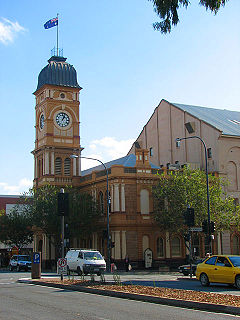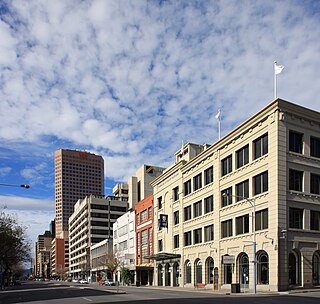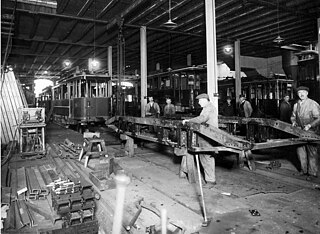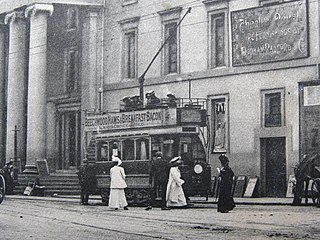
Melbourne tram route 109 is operated by Yarra Trams on the Melbourne tram network from Box Hill to Port Melbourne. The 19.3 kilometre route is operated out of Kew depot with A and C class trams.

Victoria Square, also known as Tarntanyangga, is the central square of five public squares in the Adelaide city centre, South Australia.

The Glenelg tram line is a tram/light rail line in Adelaide. Apart from a short street-running section in Glenelg, the line has its own reservation, with minimal interference from road traffic.

Norwood is a suburb of Adelaide, about 4 km (2.5 mi) east of the Adelaide city centre. The suburb is in the City of Norwood Payneham & St Peters, whose predecessor was the oldest South Australian local government municipality.

The Sydney tramway network served the inner suburbs of Sydney, Australia from 1879 until 1961. In its heyday, it was the largest in Australia, the second largest in the Commonwealth of Nations, and one of the largest in the world. The network was heavily worked, with about 1,600 cars in service at any one time at its peak during the 1930s . Patronage peaked in 1945 at 405 million passenger journeys. Its maximum street trackage totalled 291 km in 1923.

Melbourne tram route 78 is operated by Yarra Trams on the Melbourne tram network from North Richmond to Balaclava. The 6.5 kilometre route is operated out of Kew depot with A class trams.

Melbourne tram route 86 is operated by Yarra Trams on the Melbourne tram network from Bundoora RMIT to Waterfront City. The 22.2 kilometre route is operated out of Preston depot with E class trams.

The Melbourne & Metropolitan Tramways Board (MMTB) was a government-owned authority that was responsible for the tram network in Melbourne, Australia between 1919 and 1983, when it was merged into the Metropolitan Transit Authority. It had been formed by the merger of a number of smaller tramway trusts and companies that operated throughout the city.

The Municipal Tramways Trust (MTT) was established by the Government of South Australia in December 1906 to purchase all of the horse-drawn tramways in Adelaide, Australia. The Trust subsequently also ran petrol and diesel buses and electric trolleybuses. It ceased to exist on 8 December 1975, when its functions were transferred to the State Transport Authority, which also operated Adelaide's suburban train services.

The Brisbane tramway network served the city of Brisbane, Australia, between 1885 and 1969. It ran on standard gauge track. The electric system was originally energised to 500 volts, and subsequently increased to 600 volts. All tramcars built in Brisbane up to 1938 had an open design. This proved so popular, especially on hot summer nights, that the trams were used as fundraisers and often chartered right up until the last service by social groups.

The Melbourne central business district is the city centre and main urban area of the city of Melbourne, Victoria, Australia, centred on the Hoddle Grid, the oldest part of the city laid out in 1837, and includes its fringes. It is not to be confused with the larger local government area of the City of Melbourne which includes this area and the inner suburbs around it.

Until 1958, trams formed a network spanning most of Adelaide, with a history dating back to 1878. Adelaide ran horse trams from 1878 to 1914 and electric trams from 1909, but has primarily relied on buses for public transport since the mid-20th century. Electric trams, and later trolleybuses, were Adelaide's main method of public transport throughout the life of the electric tram network. The tram network was progressively closed down through the 1950s with the last lines closing in 1958; the Glenelg tram line was the only line to survive these closures and has remained in operation ever since and has been progressively upgraded and extended since 2005.
The Hawthorn Tramways Trust was a tram operator in Melbourne, Australia. Its assets and liabilities were transferred to the Melbourne & Metropolitan Tramways Board on 2 February 1920.

Camberwell tram depot is located on Council Street, Hawthorn East, a suburb of Melbourne, Australia. Opened in December 1929, it is operated by Yarra Trams. It is one of eight tram depots on the Melbourne tram network.

Trams in Ballarat were first used for public transport in 1887. They ceased to operate as a means of public transport in 1971, but a section continues to be operated today as a tourist attraction.

Currie Street is a main street in the Adelaide city centre, South Australia. It runs east–to–west from King William Street, through Light Square, to West Terrace on the western edge of the city centre.

Homansbyen Depot, officially Kristiania Sporveisanlæg was an Oslo Tramway depot located at Sporveisgata 8 near Bislett in Oslo, Norway. It was constructed for Kristiania Sporveisselskab in 1874 and was the first tramway depot in the country. The facilities were designed by Henrik Thrap-Meyer and featured an administrative office, a horse stable, a forge, a workshop, a weighing shed, and a wagon depot. It had space for 28 horse wagons, 16 sleds, and 116 horses. The administrative office was built in brick and housed apartments, offices, and a laboratory for the veterinarian. The depot was reconstructed several times, and taken out of use in 1966. It was demolished three years later, and replaced with residential apartment blocks.

The tramways in Plymouth were originally constructed as four independent networks operated by three different companies to serve the adjacent towns of Plymouth, Stonehouse and Devonport in Devon, England. The merger of the 'Three Towns' into the new borough of Plymouth in 1914 was the catalyst for the three companies to join up under the auspices of the new Plymouth Corporation. The network was closed in 1945, partly as a result of bomb damage during World War II.

Ridge Street Tram Depot was part of the Sydney tram network.

The Tramway Museum, St Kilda is Australia's principal museum of the 19th and 20th century trams of Adelaide, South Australia. It is situated at St Kilda, 24 kilometres north of the centre of Adelaide. It is operated by the Australian Electric Transport Museum (SA) Inc., a not-for-profit volunteer organisation affiliated with the Council of Tramway Museums of Australasia. It is dedicated to the study, conservation and restoration of trams that were used in Adelaide or built there, and likewise with a small bus and trolleybus collection. Trams provide rides for visitors along a 1.6 km (1.0 mi) purpose-built track between the museum and a large adventure playground.



















